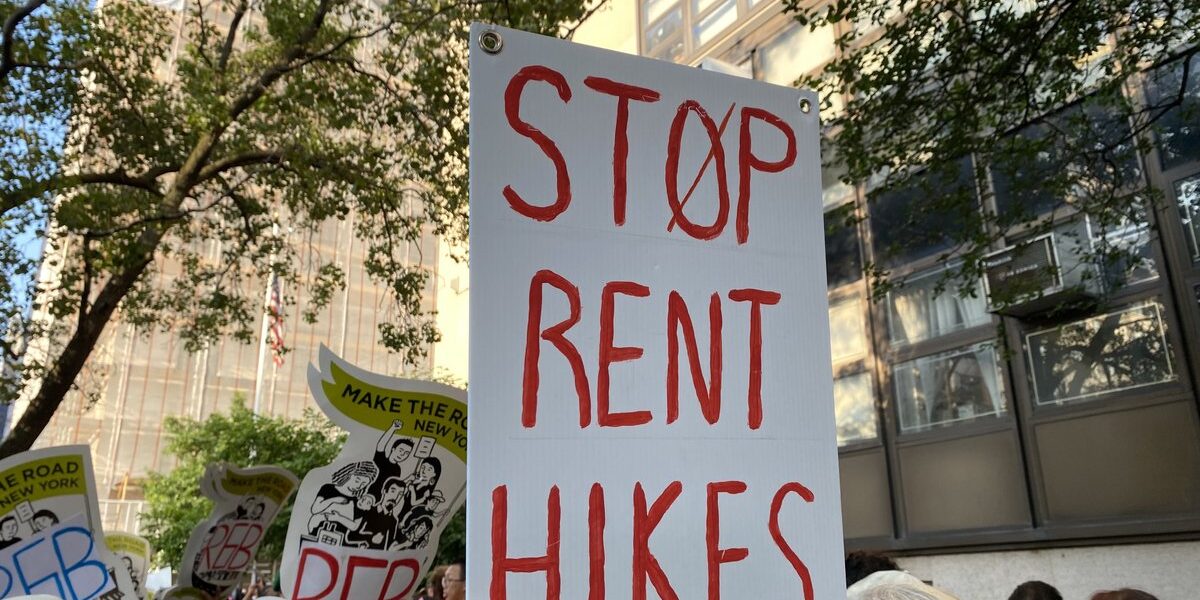Rents for New York City’s roughly 1 million rent-stabilized apartments will increase by 2.75% starting in the fall, the city Rent Guidelines Board voted on Monday.
The nine-member board of housing experts voted to allow landlords to increase rents by 2.75% on new one-year leases and by up to 5.25% on two-year leases. The hikes apply to leases signed on or after Oct. 1 for rent-stabilized apartments across the five boroughs.
The decision faced immediate criticism from tenants and activists, who marched along the sidewalk outside the auditorium at Manhattan’s Hunter College, where the board met to take the vote. Property owners also critiqued the decision, demanding even higher increases as some of them try to upend the city’s rent stabilization system in court.
Both landlords and tenants have cited the city’s ongoing affordability crisis and rising cost of living as a justification for either higher rents or a freeze on increases.
“Many of us are not able to pay the rent,” said Bronx renter Geronimo Jourdain, 76. “They make a new increase and the new percentage is compounded with the old.”
The Rent Guidelines Board — which is composed of mayoral appointees — considered a raft of data on tenant costs, landlord expenses and the overall financial situation in New York City before hearing testimony from members of the public in the weeks leading up to Monday’s binding vote.
A March report from the board found that landlord incomes for buildings containing at least one rent-stabilized unit rose by an average of 10.4% while their operating costs rose by about 6.1%. The income increases were driven by gains in Manhattan south of Harlem and East Harlem, according to the report.
A handful of demonstrators, including Assemblymember Zohran Mamdani, are arrested outside of the Rent Guidelines Board meeting.
Photo by Naim Ali-Pacheco
But landlord groups are slamming the board’s decision, saying it did not go far enough to alleviate their rising expenses, including water bills, and the growing number of buildings where expenses exceed rent. Rent Stabilization Association President Joseph Strasburg called the vote “distressing” for property owners he represents.
“This year’s RGB vote pushes the city’s largest segment of affordable housing, already in financial distress, closer to the edge of insolvency,” said Strasburg, whose organization has sued to dismantle rent stabilization in New York.
A subsequent review of renter finances compiled by board staff found that on average, tenants in rent-stabilized apartments earned far less than the city’s median income and just under half of them paid about 30% of their income on rent, a threshold considered “rent burdened” by the federal government. The study also cited record-high homelessness and a dramatic surge in eviction filings in the city.
In late April, Rent Guidelines Board members agreed to consider increases of 2% to 4.5% on new one-year leases and up to 6.5% for two-year leases. That was after the panel’s two tenant representatives demanded a rent freeze and walked out on the proceedings alongside hundreds of demonstrating renters.
Demonstrators rally outside of Hunter College, where the Rent Guidelines Board met to vote for a rent increase.
Photo by Naim Ali-Pacheco
Tenants refused to enter the auditorium for the annual hearing in a symbolic show of frustration with a panel they have dubbed the “Rent Increase Board.” A handful of demonstrators were arrested just prior to the vote after refusing to leave the sidewalk.
“I can’t afford an increase,” said renter Tammy Gersh, 60, who has lived in her Upper East Side apartment for her entire life. “I won’t be able to pay my bills.”
Board votes typically reflect the desires of the mayor who appoints the members. Under Mayor Eric Adams, the board previously voted to raise rents by 3.25% in 2022 and by 3% on new one-year leases in 2023.
The compounding annual increases over three years mark a sharp contrast from board votes under Adams’ predecessor. During former Mayor Bill de Blasio’s eight years in office, the board voted three times to freeze rents and never approved an increase above 1.5%.
The recent votes more closely mirror increases approved under the mayorships of Michael Bloomberg and Rudy Giuliani. The board raised rents by 2% to 5% every year from 1993 to 2013, according to annual data reviewed by Gothamist.
Two board members representing landlord interests had proposed an increase of 4.5% on one-year leases and 6.5% on two-year leases.
In an emailed statement, the mayor said his office was “grateful for the board’s careful consideration of the data and their decision to limit increases” after avoiding the higher end of proposed rent increases unveiled last month.
“As we have said from day one, the only way to ultimately lower rents is to build more housing, and we are using every tool in the our toolkit to build that housing more quickly — cutting red tape, implementing the new state tools we fought hard to attain, financing record numbers of affordable housing, and advancing the ‘City of Yes for Housing Opportunity’ zoning amendment that will clear the way to build a little more housing across the city in every borough,” Adams said in the statement.
Some elected officials demonstrated alongside tenants ahead of the hearing and panned the final vote.
“This is the third year in a row, right in a time of crisis, that we’re seeing this Rent Guidelines Board ignores the plight of renters in favor of the real estate industry.,” said Councilmember Pierina Sanchez, chair of the housing committee.
The Monday decision comes as landlords of many non rent-stabilized, or “market-rate,” apartments also face new limits on rent increases for the first time.
The state’s new “good cause” laws allow those tenants to challenge rent increases above about 8.8%, potentially forcing the owners to justify higher rent hikes in court.
This story was updated to include additional information about the vote, comment from Mayor Eric Adams and remarks from lawmakers and demonstrators.





